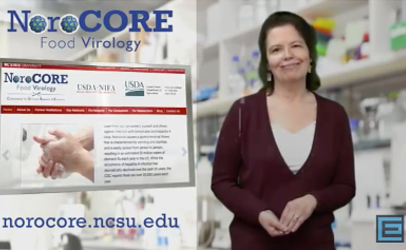More than 150 leading norovirus minds gathered in Atlanta this week to celebrate one of the most successful food safety collaborations among industry, academia and regulatory entities known as NoroCORE at the group’s “Final Showcase Meeting.”

NoroCORE’s full name is Norovirus Collaborative for Outreach, Research, and Education
The output of the 157 noro warriors since its first stakeholders’ meeting in 2012 opens new paths in dealing with the No. 1 source of foodborne illnesses: Norovirus. The final meeting event showcased progress and provided an opportunity to dive deeply into the topic of next steps.
The battle with norovirus has been ongoing since its discovery in 1968, when it was originally known as Norwalk Virus, named by the location of the original outbreak in Norwalk, OH. Globally, norovirus results in about 685 million illnesses and more than 200,000 deaths annually.
By 2011 little progress had been witnessed. The magnitude of the problem called for a proportional response. The U.S. Department of Agriculture stepped up with a $25 million grant.
The NoroCORE multidisciplinary collaboration was formed at North Carolina State University under the leadership of Scientific Director Lee-Ann Jaykus. Subcontracts pulled in an array of specialists, fueling its growth to now include 26 collaborative institutions with more than 30 investigators and more than 100 stakeholder organizations.
The flagship of NoroCORE progress is the work of scientists at Baylor College of Medicine in Texas, who developed a way to grow human norovirus in cells that line the human intestine. It is estimated that the net value of this single outcome, 40 years after the elementary school outbreak in Norwalk, OH, more than justified the investment of $25 million.
NoroCORE’s overarching objective is one of public health. For those serving the away-from-home public, its findings form a foundation for new levels of safety for those being served. The breath of benefactors includes restaurants, schools, nursing homes, hospitals, supermarkets, food processors, cruise lines, the hospitality industry, military operations and more.
Researchers form another group of stakeholders benefiting from NoroCORE. They have already started to leverage the learning, which will lead to new worldwide life-saving products and services.
Jaykus closed the collaborative’s final meeting with heartfelt thanks for her entire team, with special mentions to fellow collaborators at Emory University led by Christine Moe. The final sound from NoroCORE as it closed in its current form was from Don Schaffner of Rutgers University who led a thunderous call to keep the network in place to nurture the seeds created by this amazing collaboration.
(To sign up for a free subscription to Food Safety News, click here.)
